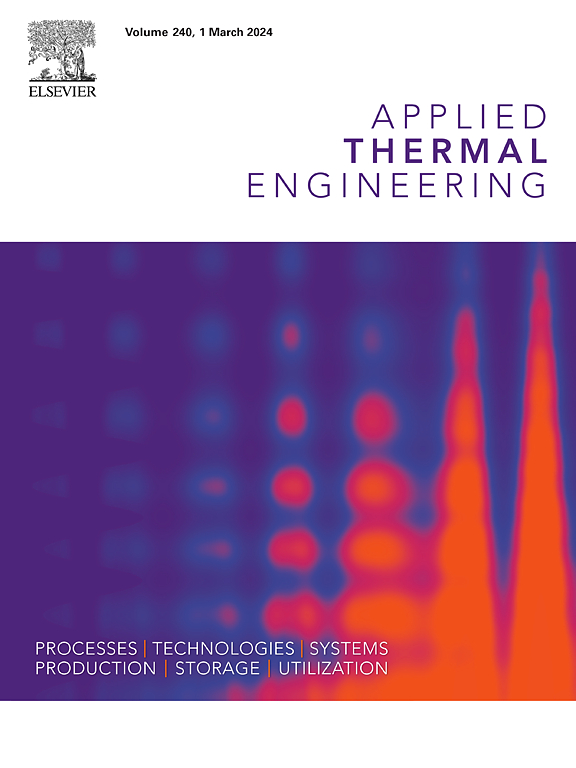过渡型湍流圆形射流撞击中的流场和传热
IF 6.1
2区 工程技术
Q2 ENERGY & FUELS
引用次数: 0
摘要
过渡类型中的射流撞击传热涉及二次最大传热的出现和消失,这对数值模拟具有挑战性。本文研究了过渡型中喷嘴板间距 H/D 在 5≤H/D≤7 范围内对传热和流场的影响。在这种类型中,次级最大传热率逐渐消失。此外,还进一步讨论了射流撞击的过渡特性。研究发现,停滞点的传热速率与到达流的雷诺数和湍流强度有重要关系。此外,根据对传热速率、间歇发展和壁面剪应力的分析,确定了过渡类型中的三种传热模式,即峰值模式(5<H/D≤5.5)、膨胀模式(5.5<H/D≤6.6)和线性模式(6.6<H/D≤7)。针对后两个方面,详细讨论了不同 H/D 下的层流区和湍流区。在峰值模式下,传热速率在很大程度上受过渡过程的影响,从而形成次峰值。而在膨胀模式下,次峰值演变为膨胀,过渡的影响变得微弱。因此,层流区的影响将延伸到下游。然而,在线性模式中,膨胀消失,边界层的间歇性发生轻微变化,传热的突变主要发生在停滞区。本文章由计算机程序翻译,如有差异,请以英文原文为准。
Flow field and heat transfer in the transitional type of turbulent round jet impingement
Jet impingement heat transfer in the transitional type involves the occurrence and disappearance of the secondary maximum heat transfer, which is challenging for numerical simulation. In the paper, the effects of the nozzle-plate spacing H/D on heat transfer and flow fields in the range of 57 within the transitional type are investigated. In this type, the secondary maximum heat transfer rate gradually vanishes. In addition, the transitional properties of jet impingement are further discussed. It is found that the heat transfer rate at the stagnation point shows an important relationship with the arriving stream Reynolds number and turbulence intensity. Additionally, three heat transfer modes, i.e., the peak (), swelling (), and linear modes (), are identified in the transitional type based on the analysis of the heat transfer rate, development of the intermittency, and the wall shear stress. For the latter two aspects, the laminar zone and the turbulence zone are discussed in detail for different . In the peak mode, heat transfer rate is largely influenced by the transition process, resulting in a secondary peak. While in the swelling mode, the second peak evolves to a swelling and the effect of transition becomes weak. As a result, the influences of the laminar region will extend to downstream. However, in the linear mode, the swelling vanishes with a mild change of intermittency in the boundary layer and the sudden mutation of heat transfer mainly takes place in the stagnation region.
求助全文
通过发布文献求助,成功后即可免费获取论文全文。
去求助
来源期刊

Applied Thermal Engineering
工程技术-工程:机械
CiteScore
11.30
自引率
15.60%
发文量
1474
审稿时长
57 days
期刊介绍:
Applied Thermal Engineering disseminates novel research related to the design, development and demonstration of components, devices, equipment, technologies and systems involving thermal processes for the production, storage, utilization and conservation of energy, with a focus on engineering application.
The journal publishes high-quality and high-impact Original Research Articles, Review Articles, Short Communications and Letters to the Editor on cutting-edge innovations in research, and recent advances or issues of interest to the thermal engineering community.
 求助内容:
求助内容: 应助结果提醒方式:
应助结果提醒方式:


